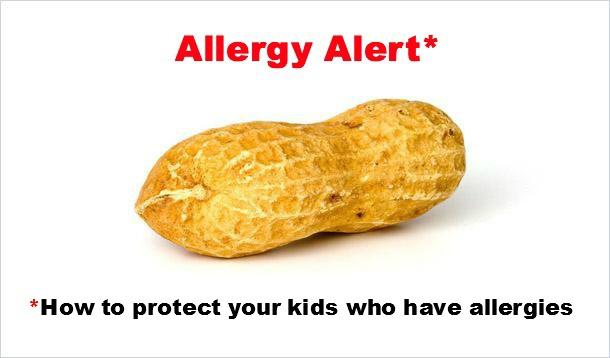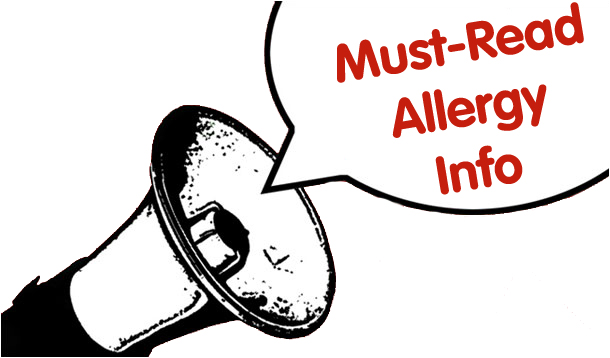
When your child is diagnosed with a severe allergy (like a severe allergy to bee stings, for example, or peanuts) it can be terrifying. The only way to cope with that fear is by arming yourself with knowledge. Here are five commonly asked questions about serious allergies in kids.
If you’ve had little to no experience with anaphylactic reactions, it can be scary to know what to look for. The truth is, it can happen fast and deteriorate quickly (possibly turning life-threatening in a matter of minutes). So it’s important to have a clear idea in your mind of the typical symptoms anaphylaxis causes, which include:
The onset of symptoms, after exposure to the allergy trigger, can take mere minutes…or they can occur several hours later. In some cases (about 20% of the time) there can be a second phase of reaction that flares after the initial reaction has subsided. This can happen one to eight hours later, but it can occur up to 38 hours later.
Sending a kid with severe allergies to school can be nerve-wracking, to say the least. But with some advanced planning, there’s no reason you can’t send your child to school, confident that they will be safe. Here's your action plan:
It’s important to start talking to your child about their allergy right away. There’s no benefit to withholding this information. They may not, of course, fully understand until they're a little older, but they will be able to grasp some of the key concepts. Your child should understand the seriousness of the allergy, the triggers and situations they should avoid, and how they can explain the allergy to classmates. You should also talk to them about recognizing the symptoms of a severe allergic reaction. In particular, it’s important that your child knows they should not trade or share food, utensils, or food containers. They should also wash their hands before and after eating, and put their food on a personal placemat or napkin.
Kids who are mature enough (usually around age 6 or 7) should have their own epinephrine auto-injector, like EpiPen, on them at all times. Younger kids will need to have a member of school staff carry an EpiPen, or have one available in the classroom.
Have an emergency plan already prepared (see above) and have emergency numbers and contacts readily available.
It’s crucial that you always have a ready-to-use EpiPen on hand. But you need to know that EpiPen Auto-Injectors expire. In our busy lives, it's easy to lose track of a small detail like an expiration date. So here’s a simple way to take care of this: register for the Expiration Reminder Service at EpiPen.ca.
It’s a common question, and a common fear—how will I know FOR SURE whether I should use my child’s EpiPen? And the short answer is: you don’t have to be sure. The very first signs of a severe allergic emergency can be difficult to interpret. But hesitating to use an EpiPen can be life-threatening. Seconds count, when it comes to severe allergic and anaphylactic reactions. Even if it turns out your child wasn't having an allergic reaction, it's better to have used an EpiPen in this situation than to have not used an EpiPen in a real emergency. A good rule of thumb: if you're even considering using it, that means you should go ahead and use it.
Severe allergies in a kid are a serious matter—but fear of a reaction shouldn't cause a kid to miss out on the wonderful experiences of childhood like school and playdates with friends. There are many strategies to prevent exposure, effective ways to deal with a reaction should one occur, and plenty of support and information.
 Severe allergies are on the rise in Canada.
Severe allergies are on the rise in Canada.
This is proudly sponsored by EpiPen®.
EpiPen.ca
The opinions expressed in this post are the opinions of the individual author and may not reflect the opinions of Pfizer Canada, the Canadian distributor of EpiPen. Pfizer Canada reviews all material to ensure medical accuracy of statements.
EpiPen® and EpiPen® Jr (epinephrine) Auto-Injectors are indicated for the emergency treatment of anaphylactic reactions in patients who are determined to be at increased risk for anaphylaxis, including individuals with a history of anaphylactic reactions. Selection of the appropriate dosage strength is determined according to patient body weight.
EpiPen® and EpiPen® Jr Auto-Injectors are designed as emergency supportive therapy only. They are not a replacement for subsequent medical or hospital care. After administration, patients should seek medical attention immediately or go to the emergency room. For the next 48 hours, patients must stay within close proximity to a healthcare facility or where they can call 911. To ensure this product is right for you, always read and follow the label. Please consult the Consumer Information leaflet in your product package for complete dosage and administration instructions.
© 2013 Pfizer Canada Inc., Kirkland, Quebec H9J 2M5 • Toll free: 1-877-EPIPEN1 (1-877-374-7361)
EpiPen®, EpiPen® Jr are registered trademarks of Mylan Inc. licensed exclusively to its wholly-owned affiliate, Mylan Specialty, L.P.; sub-licensee, Pfizer Canada Inc., Kirkland, Quebec H9J 2M5

Are you going to let your kids have Halloween candy this year? Will sugar make your kids hyperactive? Or worse—is sugar toxic?
Sugar has recently become a hot-button topic. There have been YouTube videos about sugar that have gone viral, The Fifth Estate episode that aired earlier this month, and some very heated debates between experts. There have been some pretty fiery debates between regular folks, too—check the 738 comments under this CBC post. Everyone seems to have an opinion on sugar, and those opinions seem to be strong ones.
Trouble is, not even the experts agree. And there’s a lot more research to be done. But can we all just wait patiently until they’ve done all the studies, and everything has been clearly figured out once and for all?
No, we cannot.
We have to decide what to put in our kids’ lunchbox today. We have to make the call on birthday party treats right now.
So we do the best we can. And right now, here’s what I’m thinking: sugar is not evil. We are hardwired to crave sugar, from a survival/evolutionary point of view, and the truth is, our bodies and brains require glucose for energy. For that, and many other reasons, we cannot do away with sugar altogether.
But excess sugar is not a good thing. Excess sugar is undoubtedly linked with a lot of health problems: obesity, tooth decay, heart disease, and diabetes, in particular. Cutting down on sugar intake is something we probably all can, and should, do. How to do it? I’ll get to that in a minute.
When my first son was little, we lived in a condo in Vancouver. And my boy was (and still is) very, very active. Underneath us lived a woman who was in her fifties, single, no kids. We had hardwood floors. You can see where I’m going here. It was a constant source of stress to keep my healthy, happy, naturally exuberant kid quiet, and stop him from running up and down the halls.
One day my downstairs neighbour asked me, pointedly, if I gave my son a lot of sugar. (I didn't, and even when he did have something sugary, it made zero difference.) But she insisted on schooling me about the evils of sugar.
It was a very awkward conversation.
(Side note: the next people who moved in were a retired pair of empty nesters whose two boys were all grown up and they made a point of saying: DO NOT worry about the noise. We’d be more concerned if there WASN’T any noise coming from your apartment! I gave them big hugs. Often.)
But that's just my experience. What does the research tell us about kids and sugar and hyperactivity?
Well, like many things, results have been somewhat conflicting. However, several years ago a meta-analysis of hundreds of studies on the subject concluded there was no connection between sugar and ADHD.
So why do so many parents swear their kids get wired on sugar? Some scientists have explained this with a hypothesis that certain kids are "sugar sensitive." Which means sugar doesn’t have a universally negative effect on all kids—just a few of them.
Another explanation is this: sometimes, we see what we want to see.
In one particularly revealing study, children with “sugar sensitivity” were separated into two groups. One group was given sucrose (table sugar), the other given artificial sweetener. Their parents were told which substance their kids had received, then asked to rate their kids for hyperactivity. The parents of the sugar group rated their kids' behaviour as being much worse than the sweetener group. The punchline: in truth, both groups had received sweetener.
That said, we undoubtedly have more to learn. I read a theory recently that the problem isn't the immediate response to sugar—instead, it’s chronic, excessive sugar intake that may lead to hyperactivity and ADHD-type behaviour by causing changes in the brain’s receptors. But at this point that's just a theory.
Essentially, I don’t think it’s a problem for most kids to have Halloween candy, once a year.Or birthday cake from time to time. I do think if a kid has excessive sugar intake all the time, all year round, it can lead to problems. But that's not rocket science, right?
How to reduce your family's sugar intake? Well, you might consider cutting out sugar entirely for a period of time, to break the addiction, like a “sugar detox.” Here's how one writer did just that.
Here are some other ways to cut down on excessive sugar:
The bottom line? It's up to you how to handle Halloween candy in your house, but my vote is for maintaining a year-round sensible approach to controlling sugar intake...and at Halloween, a few mini chocolate bars and rocket candies are just fine.
(But not those Halloween kisses with the ghosts and witches on the orange wrapper. Those are just gross, right?)
Check out more scary secrets for making this Halloween terrific-ly terrifying.

How many of you learned about periods from Are You There God? It’s Me, Margaret?
I’m pretty sure Judy Blume educated an entire generation about the finer points of puberty. Or, maybe, you remember having The Talk with your mother. For many of us, it's a poignant memory.
And now—flash forward several years—it's time for your own daughter to learn about the changes her body will soon be going through. Maybe you don’t exactly relish the idea of talking to her about it. Or maybe you’re looking forward to it, but don't know where to start. Either way, if your daughter is hurtling towards puberty at light speed, it's time to do a little planning and prepare yourself for "The Talk."
Here are some questions you might have:
Make sure you talk to her early. Nobody likes unpleasant surprises. The last thing you want is for your daughter to be shocked, confused, and scared by the onset of menstruation. How early is early enough? Most girls have their first period when they’re 11 to 13, so you want to open up the conversation well before this. Of course, period onset can be much earlier—even as young as 8—or later, up to age 16. If you pay attention to the early signs of puberty, that can help guide your initial talks. Most girls will have their first period about two years after their breasts begin to develop.
Explaining the biology of menstruation is important, of course, but don't get too hung up on this. Most girls are more interested in the practical stuff: When am I going to get a period? What is it going to feel like? Can I go swimming when I have my period?
You'll need a nice, clear way of explaining menstruation. Explain to your daughter that when she starts having periods it means that her body is physically capable of becoming pregnant. The ovaries in her body will release an egg every month or so, and that's called ovulation. During that time, hormones in her body will be preparing her uterus for a pregnancy by thickening the lining. If the egg isn't fertilized, the lining of the uterus is shed through the vagina—and that's a period.
Probably not a good idea. You may think you know everything you need to know—but you may be caught off guard by the questions your daughter has. Like: how much blood do you actually lose during a period? (Do you know? The answer: about 3 tablespoons. Surprisingly little, right?)
A little advanced prep can prevent a lot of awkward moments. And brushing up on the facts will allow your daughter to see you as a trusted source of information. But please don't randomly google the subject (here's why that's a bad idea, in general). Instead, check authoritative websites for information and tips on having The Talk.
And while you're at it, check out www.BeingGirl.com, a website aimed towards girls themselves—which can give a little insight into the kinds of things girls want to know, but are perhaps too shy to ask.
The trouble, of course, is that nobody can predict exactly when a girl will start getting periods. As I mentioned, most girls will have their first period about two years after their breasts begin to develop. As another guideline, it's common for a girl to start menstruating at roughly the same age you did.
Typically, what girls are expressing when they ask this question is the fear that it will happen at an inopportune moment. Help your daughter by coming up with a plan, including things she might say to a teacher if she has to excuse herself to the washroom. Even if that teacher is (gasp!) a male. Supply her with an emergency pack for her locker or backpack that includes a pad, a tampon, and a fresh pair of underwear. Explain that many school and public bathrooms have coin-operated dispensers for pads and tampons, and that the school nurse might have supplies.
Discuss how to use pads or tampons, and that it's important to change them every three to four hours. Many girls prefer to start with pads, but it's perfectly okay if your daughter wants to try using tampons right away. Explain that it might take some practice to figure out how to insert them, of course. Have various products ready and available to show her, as props for your talk, to make the concept a little less abstract.
Even better, show her this video that discusses how to insert a tampon. It's a big-sister style explanation and uses plain, no-nonsense language.
Some girls may come right out and ask you about it. Others may need a little more encouragement, and you'll have to gently initiate the conversation. Make sure you keep things casual and open, and that she knows you're available to talk anytime. Consider having a series of shorter sessions with your daughter, instead of one exhausting marathon.
Be sure to open the talk up to all kinds of other topics (body changes, odour, mood changes) and let her know that there are no silly questions. That's the beauty of having a series of talks—you can tackle different subjects each time. Also, it's a great idea to talk about what boys are going through at this stage of life, too! Girls will be curious about this but may be too shy to ask.
Make no mistake, it's a delicate subject you've got on your hands. Preteen girls get embarrassed at...well, pretty much everything...so they’re definitely going to get embarrassed at this talk. That's okay. It’s not a reason to avoid the subject, but it is a reason to plan for it. You can give your daughter all the information and confidence she needs, while making make wonderful memories for the two of you.
So tell me, have you had The Talk with your daughter yet? How did it go? I'd love to hear about your experiences and thoughts.
